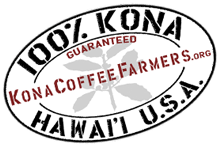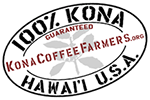E-MAILED—ORIGINAL TO FOLLOW
March 17, 2012
The Honorable Clarence K. Nishihara Kona Coffee Farmers Association
Chairman, Senate Agriculture Committee Legislative Committee
State Capitol, Room 204 P.O Box 5436 Kailua-Kona, HI 96745
415 South Beretania Street
Honolulu, HI 96813
Dear Senator Nishihara:
RE: HB280, HD1/SD1 (Relating to Agriculture)
Thank you, for including us in the meeting yesterday on HB 280 with the Hawaii Coffee Company and the Hawaii Department of Agriculture in your offices. We regret that we could not attend in person as discussing this complicated and highly charged issue over the phone proved difficult. It might have been better if we all could have shared a cup of coffee.
We are aware that the Hawaii Coffee Company and those for whom they speak represent some of the largest commercial interests in Hawaii. KCFA and other grass roots farming organizations also represent important people—the hundreds of families in Kona and throughout Hawaii who farm. The suggestion by others in the meeting that KCFA is just some “50 people” whose views are not equal to those large commercial interests was disingenuous and insulting.
As is discussed in the attached memo sent before the meeting, we felt our March 15 teleconference with the Hawaii Coffee Company was productive. We thought it brought us closer together on the issue of protecting the commercial value of Hawaii’s “origin” coffees. We fully agree that guaranteeing the origin of Kona and Hawaii’s other unique coffees is vital to all our futures and the future of many Hawaiians.
We obviously differ on the best way to do that, but our views should not be dismissed because they differ from others who seem to claim their views are more important. As we said at the very beginning of the meeting, we hoped that the discussion would not be a matter of only two sides and that we would try to find a middle ground. Unfortunately we may all ehave run off a cliff.
We do not think, as the Department of Agriculture has repeatedly testified, that: “a voluntary certification program, and mandatory compliance with grading standards and origin documentation . . . will provide sufficient protection for Hawaii’s coffee industry.” We are concerned that “documentation”, without HDOA’s oversight and “certification” of origin will just amount to enhanced record keeping and do little to guarantee origin.
Mandatory certification of at least “Prime” grade, for all wholesale quantities of green coffee shipped out of origin is a key component of HDOA’s current rules for certifying origin. Jettisoning even this minimal quality assurance in favor of “voluntary certification” will, as it has before, enable fraud and erode the reputation of Kona and other Hawaiian origin coffees. Quality assurance is a component of successful product origin regimes. We are advised, for example, that the lack of a single quality standard in Puerto Rico has eroded buyer confidence there.
We also agree with others at the meeting that HDOA’s current grade certification procedures are too subjective, often ad hoc and not in compliance with HDOA’s own rules. This has likely contributed to the frustration many feel with the grade certification process. That is why we suggested a more objective way of determining “Prime” certification as a way to preserve the current minimum quality requirements of HDOA’s rules.
Though it fell to me to write this letter, KCFA’s leadership has vetted and approved it. KCFA agrees with many of the points and concerns HB280’s proponents have raised, but will be compelled to continue to oppose the bill if it does not include a more robust program to protect “origin” than has thus far been proposed.
Very Truly Yours,
KCFA Legislative Committee
S/ David S. Case
By: David S. Case, Member
cc-Electronic Only:
Cea Smith, President, KCFA
Glenn Martinez, President, Hawaii Farmers Union United,
Senator Gilbert Kahele
Senator Josh Green, M.D.
Russell Kokubun, HDOA Chair
Wendy Clerinx, Advisor to the Governor
John Buckstead, Advisor to the Governor
Bruce Corker, Chair, KCFA Legislative Committee
Colehour Bondera, Member, KCFA Legislative Committee
Jim Wayman, President, Hawaii Coffee Co.
West Hawaii Today
Honolulu Star Advertiser
Associated Press
Enclosure (as stated)
MEMORANDUM
TO: Senator Clarence K. Nishihara,
Chairman, Hawaii State Senate
Committee on Agriculture
THROUGH: Senator Gilbert Kahele
Vice-Chairman, Hawaii State Senate
Committee on Agriculture
FROM: Legislative Committee, Kona Coffee Farmers Association (KCFA)
SUBJECT: HB280, SD1 (RELATING TO AGRICULTURE)
DATE: March 16, 2012
A. INTRODUCTION
At the conclusion of its March 13 hearing on HB280, HD1, the Senate Agriculture Committee deferred the Bill for decision until March 20. The Chair advised the proponents and opponents of the Bill that he would make time to meet with them to see if a mutually acceptable HB280, SD1 could be drafted for the Committee’s approval. Otherwise the Bill would die.
KCFA President Emeritus, Colehour Bondera, Legislative Committee Chair, Bruce Corker, and Committee Member, David Case, met with Hawaii Coffee Company President, Jim Wayman, by teleconference on March 15. A diplomat might say that it was a “full and frank discussion” of the background, purpose and the language that the proponents have advanced in support of the Bill as well as questions and concerns KCFA has about it.
B. DISCUSSION
- HB 280’s Origin and Purpose
The Bill’s proponents, representing some of Hawaii’s largest coffee growers, processors and marketers, contend that the current mandatory certification of grade and origin in Hawaii Revised Statutes (HRS) §147-7(d) and the corresponding prohibitions under HRS §147-23(b) should be repealed. Instead they propose a program of mandatory documentation (but not certification) of origin with severe criminal penalties and voluntary certification of grade. The proponents have developed these proposals in consultation with the Hawaii Department of Agriculture (HDOA), but for various reasons were not able to draft the legislation now being proposed until shortly before the Committee’s March 13 hearing.
KCFA was not invited to participate in this process and was unaware of the purpose and background of the legislation until the March 15 teleconference. Based primarily on that teleconference, KCFA understands that mandatory certification of grade has become an obstacle to the effective marketing of Hawaiian coffee—particularly large quantities of green coffee, but also natural coffees and coffee with defects due to coffee berry borer damage. The proponents also voice concern that HDOA’s grade certification criteria are subjective and often ad hoc without any basis in HDOA’s rules. These factors, coupled with reductions in the number of HDOA inspectors in 2009, have led to some delays in coffee inspection and certification resulting in significant financial and business uncertainty for coffee processors and marketers.
- KCFA’s Current Position
a. Origin Documentation/Certification
KCFA is an organization generally representing small, family coffee and mixed crop farms of between 2 to 10 acres located in the historic Kona Coffee District of Hawaii County. Ever since the notorious Kona Kai scandal, its members have relied on HDOA’s inspection and certification of both grade and origin to insure the high quality and corresponding market price of Kona coffee. KCFA agrees that tougher, more consistent certification (not just “documentation”) of origin is essential to protect the statewide, Hawaiian coffee industry from counterfeiting of the sort that led to the Kona Kai affair. We are concerned that merely “documenting” origin will be or become a mere matter of record keeping without active HDOA oversight (that is certification) of origin.
b. Grade Certification
KCFA also agrees that HDOA’s current criteria for inspecting and grading coffee are often too subjective and susceptible to the inspectors’ ad hoc determinations that have no basis in HDOA’s rules. For example, we know of situations where parchment has been down graded because it had been stored more than 8 months, even though it was stored in a climate controlled room and to the best of our knowledge was not otherwise defective under the Hawaii Administrative Rules (HAR). See HAR §4-143-6(i), (j) and (k).
KCFA believes, however, that some certification as to quality is necessary to maintain Hawaiian “origin” coffee’s reputation and market value. We believe that outright abandonment of any required HDOA grade determination will lead the consumers of Hawaii’s origin coffees to conclude that they are of inferior or at least uncertain quality. A system requiring all “origin” coffees to be of at least “Prime” quality to be certified as to their specific Hawaiian origin would meet this concern. See Hawaii Administrative Rule (HAR) §4-143-6(e), (f) and (g). KCFA would propose, however, that this determination be made solely by visual and other more objective requirements than taste—eliminating the requirement that Prime coffee be brewed to be certified as is now required under HAR §4-143-6(e).
- Proposed HB280, SD1 Language
The language HB280’s proponents have informally advanced as currently drafted illustrates the difficulty of writing legislation to address complex problems in the rushed time frame of a legislative session. That is particularly true as in this case when the legislation was introduced after the January 25, 2012 deadline for bill introduction and could not be sufficiently researched, vetted with a wider range of stakeholders and given a thorough and deliberate legal review. The core of the proposal is new §147-11 (“Hawaii Coffee Counterfeiting”) to be added to “Part I” HRS Chapter 147 (dealing with the general rules relating to commodities), yet the definitions to be used in §147-11 are lodged in Part II of HRS Chapter 147, dealing with the “export” of those commodities.
Beyond that the definitions themselves define terms that either are not used in §147-11 (such as “Coffee Cherry” and “Coffee Parchment”) or terms used in §147-11 (such as “beans”) that are defined differently in the applicable regulations. Compare HAR §4-143-3 defining “Bean” to mean only “the seed of the fruit of the coffea arabica plant” and proposed HRS §147-21 defining “Hawaii grown coffee” to mean “beans grown in the State of Hawaii, to include unroasted seeds of the coffee plant in all its forms including coffee cherry(ies) and coffee parchment.” Proposed §147-11 imposes criminal penalties for its violation. The terms on which it relies should be carefully defined to avoid ambiguity as to their meaning that might frustrate prosecution.
C. CONCLUSIONS
KCFA is willing to work out a mutual solution, but without surrendering the integrity of Hawaii’s origin coffees through self-directed quality certifications that are notoriously subject to abuse and deception as Kona Kai taught us. KCFA supports the intent of HB280 and could support the legislation if it can be revised to provide for a more robust “certification” system to ensure the integrity of both the origin and the basic quality of Hawaii’s unique specialty coffees as well as successful prosecution for violating the statute. If those purposes can be agreed upon, the Bill must be carefully drafted to achieve them. KCFA proposes that it prepare the next draft of HB280, SD1 for consideration.

